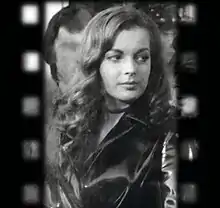Max et les ferrailleurs
Max et les ferrailleurs (US: Max and the Junkmen) is a 1971 Franco–Italian crime drama film directed by Claude Sautet. The film is based on the novel of the same name by Claude Néron.
| Max et les ferrailleurs | |
|---|---|
 Video cover | |
| Directed by | Claude Sautet |
| Produced by | Raymond Danon |
| Written by | Claude Sautet Claude Néron Jean-Loup Dabadie |
| Starring | Michel Piccoli Romy Schneider Georges Wilson |
| Music by | Philippe Sarde |
Release date | 1971 |
Running time | 112 minutes |
| Country | Italy, France |
| Language | French |
Plot
Born into a wealthy family of French vintners, Max (Michel Piccoli) is a loner who devoted himself entirely to his obsession: the arrest of criminals.[1] A former judge he is a police inspector and he sees a new band of burglars escape. This failure is still fresh in his mind when he meets Abel who has become a scrap thief and plunders construction sites with a small band of hoodlums around Nanterre. Max plans to encourage them to commit something big and catch them on the spot. Posing as a client, he meets Lily (Romy Schneider),[2] a young German-born prostitute who is the companion of Abel.[3] He pretends to be the director of a small bank branch which receives significant amounts of money at regular intervals. He ensures the support of his police commissioner. Max fails however to reveal his role as instigator. Gradually, some feeling arises between Max and Lily. But Max keeps a reserved attitude and merely influences the scrap through her. Finally, guessing the band ready for action, he communicates an ideal date to commit robbery. On the scheduled day, the police await them and they are arrested. Later in the police station, Rosinsky (the top cop in the bank's district) reveals to Max that he wants all collaborators brought to justice, including Lily. Distraught, Max tries to save her and ends up threatening Rosinsky. In an argument, Max pulls out his gun and kills him.[4]
Cast

- Michel Piccoli as Max
- Romy Schneider as Lily
- Georges Wilson as Chief Inspector
- Bernard Fresson as Abel Maresco
- François Périer as Rosinsky
- Boby Lapointe as P'tit Lu
- Michel Creton as Robert Saidani
- Henri-Jacques Huet as Dromadaire
- Jacques Canselier as Jean-Jean
- Alain Grellier as Guy Laronget
- Maurice Auzel as Tony
- Philippe Léotard as Losfeld
- Robert Favart as Loiselle
- Dominique Zardi as Baraduch
- Albert Augier as a client of Lily
- Betty Beckers as Maria
References
- A. O. SCOTT. Claude Sautet’s ‘Max et les Ferrailleurs’ AUG. 9, 2012 ny times
- Foundas, Scott (10 January 2013). "French Crime Master Claude Sautet's 1971 Film Max and the Junkmen Finally Arrives in L.A." laweekly.com. Retrieved 6 April 2017.
- "Max And The Junkmen – Cinematheque". cia.edu. Retrieved 6 April 2017.
- "Max and the Junkmen Review". chicagotribune.com. Retrieved 6 April 2017.